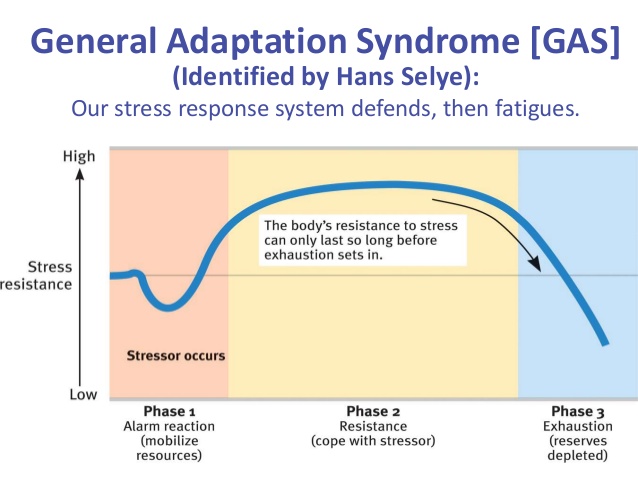Hans Selye is an internationally renowned medical researcher from the mid-1930s to the late 1970s. Dr. Selye coined the concept of General Adaptation Syndrome (GAS), otherwise known as the “stress response.” An M.D. holding a Ph.D., DSc, and FRS, Dr. Selye solely authored 32 books and wrote over 1500 original and review articles in the fields of endocrinology, steroid chemistry, experimental surgery, and pathology. This short blog simplifies the components of the General Adaptation Syndrome stages and lists some supplements that may prove beneficial in reversing some harmful effects of the stress response.
Three Phases of General Adaptation Syndrome
Dr. Selye’s General Adaptation Syndrome involves three phases: Alarm Phase, Stage of Resistance, and Stage of Exhaustion.

Stage of Alarm
Body’s immediate response to stress
- Cortisol is elevated
- DHEA is elevated
Common symptoms for this portion of the General Adaptation Syndrome stages:
- Tissue catabolism
- Low blood glucose levels
- Gastro-intestinal erosions
- Sleep issues
Stage of Resistance
This stage is initiated by the pregnenolone steal in which cortisol is made at the expense of DHEA to sustain adaptability.
- Cortisol is elevated
- DHEA is decreased
- Epinephrine may be increased to help sustain energy and blood sugar levels
Common symptoms for this portion of the General Adaptation Syndrome stages:
- Sleep issues, due to high cortisol
- Some people stay in this phase for a lifetime, while others further deteriorate
Stage of Exhaustion
The body loses the ability to adapt/body is burnt out from stress.
- Cortisol is low
- DHEA is low
- Epinephrine is low
Common symptoms for this portion of the General Adaptation Syndrome stages:
- Severe fatigue
- Allergies
- Inability to sleep through the night
- Salt cravings
Supplements to Restore Depleted Adrenal Reserves
- Panax ginseng (Korean ginseng)
- Eleutherococcus senticosus
- Glycyrrhiza glabra (licorice)
- Ashwagandha
- Rhodiola rosea
- Adrenal cortex glandular
- B complex
- Vitamin C
References:
- Head, KA and Kelly, GS. (2009). Nutrients and Botanicals for Treatment of Stress: Adrenal Fatigue, Neurotransmitter Imbalance, Anxiety, and Restless Sleep. Alternative Medicine Review, 14 (2), 114 – 140.
- Selye, H. (1950). Stress and the General Adaptation Syndrome. British Medical Journal, 1 (4667), 1383 – 1392.
- Szabo S, Tache Y, and Somogyi A. (2012). The legacy of Hans Selye and the origins of stress research: A retrospective 75 years after his landmark brief “Letter” to the Editor of Nature. Stress, 15 (5), 472 – 478

